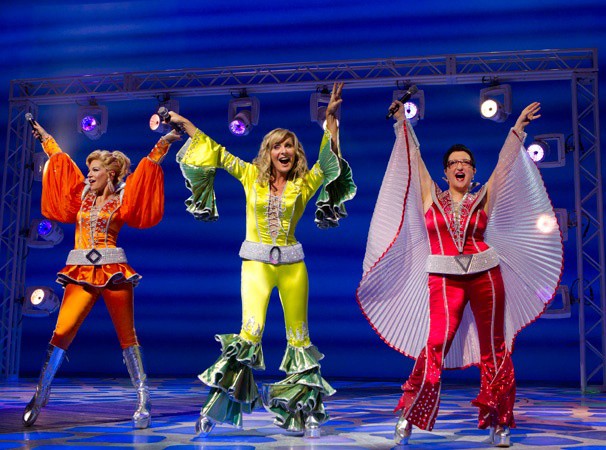The
musical “Mamma Mia!,” which closes on Broadway this Saturday after 14 years, is considered the equivalent of what the literary and film industries refer to as “chick lit” and a “chick flick” — in this case, a “chick musical.” In this genre, the story, often a
light romantic comedy, is told from a woman’s perspective. These films, books and
musicals are then heavily marketed to women, and women make up a large portion
of their audiences.
In
the 2013–2014 season, the most recent season for which statistics exist, 68% of
the Broadway audience was female, making Broadway an ideal place for stories
written by, directed by, and about women. “Mamma Mia!” was embraced by
theater-goers and, despite slow sales earlier this year that led to its
closing, is leaving with audiences at full capacity.
Serious-minded
theater-goers may be turned off by the music of ABBA, the ’70s Swedish pop
group known for such hits as “Dancing Queen” and “Mamma Mia!” or the
jukebox-musical form itself. They may dismiss the entertaining and sweet story
written to carry the songs, but one cannot deny that the producers, led by
producer Judy Craymer, and creative team have crafted a highly successful show.
When
“Mamma Mia!” closes, it will have played over 5700 performances and will have
grossed about $625 million, making it the eighth longest-running musical in
Broadway history and the longest running jukebox musical, a term referring to a
show with a story written around an existing catalogue of songs. It is also the
fourth top-grossing
Broadway musical
as of last year.
At
the 2002 Tony Awards, the musical received five nominations, including Best
Musical. It has played all over the world, with a worldwide gross over $2
billion.
Its
success extends beyond the theater. “Mamma Mia!” is one of only five Broadway
shows from the past 15 years to be made into a film. Starring Meryl Streep and
Amanda Seyfried, the 2008 hit made $144 million and is the fourth highest-grossing movie musical to date.
Pretty
impressive numbers for a show that many regard as fluff.
More
impressive, “Mamma Mia!,” both the show and film, were directed by Phyllida
Lloyd, who in 2001 was only the third woman to direct a major Broadway musical
after Julie Taymor and Susan Stroman. Catherine Johnson wrote the musical book
and screenplay, about a young girl named Sophie who, unbeknownst to her mother,
invites three men to her wedding, any one of whom could be her father. The show
ends with the audience dancing in the aisles.
The
musical owes much of its success to female audience members who want to see
musicals about women told from a woman’s perspective, and women, young and old,
love and identify with these characters. Alyse Alan Louis, who played Sophie
from 2009 to 2010, remembers little girls clamoring to meet her after the show.
“I have incredible memories taking pictures with them, receiving their hugs,
signing their programs, hearing them sing songs from the show, and answering
their questions,” she said in an email. “Many were wearing boas and tiaras, just
like [the characters] Donna, Tanya and Rosie.”
Despite
its success and many fans, “Mamma Mia!” has not been highly regarded. Ben
Brantley’s original New York Times review compared the show to a Hostess
cupcake in the first paragraph, even though he went on to say that all its
negative qualities are turned into virtues and that “it gives off a moist-eyed
sincerity that is beyond camp.”
Confining
light and comedic musicals by women and about women into this “chick musical” genre
may help sell tickets, but it does a disservice to the work and how women
writers and their stories are viewed in the marketplace. Victoria Myers, who
runs the feminist theater website The Interval, was quoted in a recent article in The Guardian saying, “We don’t talk
about women and their work the same way we talk about men — and we don’t
celebrate it the same way.”
Other
smart and successful musicals about women were similarly shrugged off when they
opened. Two years after “Mamma Mia!,” “Wicked,” the third highest-grossing
musical as of 2014 at $867.12 million, was also given a lukewarm New York Times
review, in which Brantley compared Glinda and Elphaba’s relationship to “sobfests
about female friendships like the movie ‘Beaches.’” He added, “You keep expecting
Glinda to start singing, ‘Did you ever know you were my hero, Elphaba?’” “Wicked”
also has a female bookwriter, Winnie Holzman, and in 2004 was also nominated
for Best Musical at the Tony Awards.
Broadway
audiences, especially women and young girls, want to see women’s stories on
stage, whether these stories explore lesbian identity, as in this year’s Tony-winning
chamber musical “Fun Home,” female friendship on a grand scale as with “Wicked”
or the free-spirited mothers and daughters of “Mamma Mia!” Women, and
men, too, will see these shows and the subsequent films and make them
successful. Whether they are dramatic or “fluff,” musicals by and about women need
to be taken seriously.






